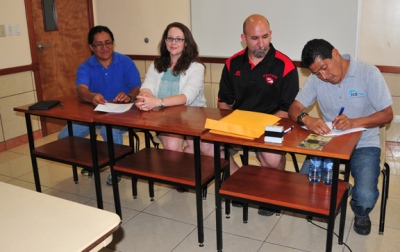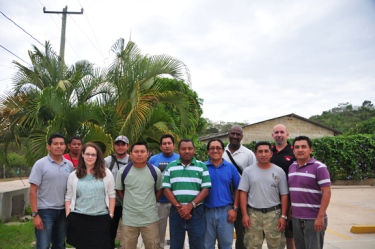Ogden News
Partnership established to study, protect cave & karst area in Central America
- Wednesday, June 10th, 2015
WKU signs cooperative agreement with conservation organization in Belize
Faculty from WKU’s Department of Geography and Geology and Friends for Conservation and Development (FCD) of Belize formally signed a cooperative research, training and partnership agreement last month that is the culmination of several years of working together to identify mutual goals and seek resources.
FCD is a non-profit, non-governmental organization in Belize dedicated to the conservation of the environment through public awareness and development of human resources. Since 2006, FCD extended its mission to promote a proactive approach to natural resources conservation through the direct management of core protected areas. FCD has a co-management agreement with the Forest Department for on-ground management of the Chiquibul National Park, which spans over 289,000 acres, and the Las Cuevas Research Station, and a separate management agreement with the Institute of Archaeology (IA) for the administration of the Chiquibul Cave System.

Faculty from WKU’s Department of Geography and Geology and Friends for Conservation and Development (FCD) of Belize signed a cooperative research, training and partnership agreement on May 5. From left: FCD Board of Director’s President Dr. Filiberto Penados, WKU faculty member Dr. Leslie North, WKU faculty member Dr. Jason Polk, and Executive Director Rafael Manzanero.
Dr. Jason S. Polk, Director of the Center for Water Resources Studies at WKU, and Dr. Leslie A. North, Director of Karst Field Studies in WKU’s Department of Geography and Geology, joined Executive Director Rafael Manzanero and FCD Board of Director’s President Dr. Filiberto Penados, along with FCD staff, to sign the MOU on May 5 at the FCD Headquarters in San Jose Succotz, Belize.
Prior to the signing event, Dr. North and Dr. Polk held a full-day workshop for FCD staff and Chiquibul Park rangers on cave and karst management. Topics included methods and techniques for cave and karst inventory, karst ecotourism and education, and cave and karst geology and hydrology, including discussions and training on how to implement these within the Chiquibul National Park region and the prominent Chiquibul Cave System.
The Chiquibul National Park includes the area surrounding the Caracol Archaeological Reserve, one of the largest ancient Maya archaeological sites in Central America, and the Chiquibul Cave System, which was discovered and explored in the early 1970s and ‘80s and featured by National Geographic in 2000. Since then, much work has been done by FCD to institute a robust management program in the largest protected karst region in Belize. Dr. North and Dr. Polk bring significant experience in this field, and with WKU’s main campus being situated within an iconic karst landscape, including nearby Mammoth Cave, the longest known cave system in the world, the partnership provides a distinct opportunity for knowledge exchange and student engagement. The hope is to build capacity for research and education about international karst management and comparisons between two unique, yet similar, karst regions, including the associated human and water resource impacts at each location.
Through the signed agreement, WKU and FCD identified several areas of collaboration, which include training of Chiquibul karst management staff and rangers, capacity building for the use of Geographic Information Systems (GIS) for resource management, best practices for education and recreation, gathering of hydrology and climatology data, and working to collect field data to assist in cave and karst resource management. Additional components include providing FCD with technical assistance to promote good science and best practices in ecosystem planning and management and developing and executing a training program for karst management and cave resource inventory within the Chiquibul National Park. A primary goal is also to build relationships with stakeholders and existing partners, such as the Caribbean Community Climate Change Centre, with whom WKU recently signed an MOA that includes components related to climate and water resources science and education. Other governmental entities and local NGOs, like Lower Dover Field Station, will also be involved in promoting the protection of this fragile natural system.
“The partnership with WKU provides us with an opportunity to learn best practices and build our capabilities to better protect the rich natural and cultural resources of the Chiquibul forest,” Manzanero said. “We feel honored to have this opportunity to learn from experts in the science and field of karst management.”

Staff members of Friends for Conservation and Development of Belize and WKU faculty participants from the karst management training workshop held in San Jose Succotz, Belize.
FCD was successful, through partnership and support from WKU, and others, in receiving a Protected Areas Conservation Trust (PACT) grant for integrating karst management in the Chiquibul Forest. Under this funded project, the team is working to develop a karst management strategy and train a team of rangers to collect data and determine the resource priorities for protection in the Chiquibul karst area. In addition, Dr. Polk has been appointed as a member of the Chiquibul Cave System Technical Working Group, which is tasked with advising on best management practices for the cave and its inherent natural resources through an effective cave management plan, research activities, and providing technical expertise.
The Chiquibul Cave System is one of the largest cave systems in Central America, located within Belize and Guatemala and home to the Chiquibul River, most of which flows underground. The cave is also home to two of the largest cave chambers in the world and has over 50 km of mapped passages, containing vast geologic and archaeological resources that have barely been studied. The watershed encompassing the cave is one of the most significant in the region, providing water to over ¼ million people in Belize and Guatemala, and is threatened by illegal logging, mining activities, and agricultural activities.
Through the recent agreement, WKU and FCD hope to work together with other partners to address the management needs of the cave and karst area surrounding Chiquibul, as well as examine the climate, water resource and human impacts. The landscape and caves are threatened by deforestation, looting and encroachment, among others. The working group is supporting the implementation of the management plan that was made possible through the support of The Nature Conservancy Tennessee Chapter in 2009. The intent is to incorporate the newest scientific research tools and advanced training methods to address the issues in the Park. Eventually, the hope is to achieve a World Heritage Site status for the cave and surrounding area. This designation would foster knowledge of the precious and vast resources preserved within its boundaries.
“FCD has done an excellent job of prioritizing the conservation and preservation of some of Belize’s most fragile and rich resources in the form of the karst region of Chiquibul, and the cave system itself,” Dr. Polk said. “I’ve been working in Belize for over a decade and know firsthand the challenges of this task and also how important these types of activities are in providing stability with regard water resources and ecosystem protection. It’s very important to protect these resources, which can best be done by scientific study and documentation to inform the excellent management efforts being put forth by FCD. Through this partnership, we will be able to advance these efforts and provide new knowledge about a vast and significant karst region that is of importance to the region through partnerships and engaging our students in the types of activities that immerse them in the landscape to conduct applied research.”
Contact Jason Polk, jason.polk@wku.edu or (270) 745-5015
Some of the links on this page may require additional software to view.

